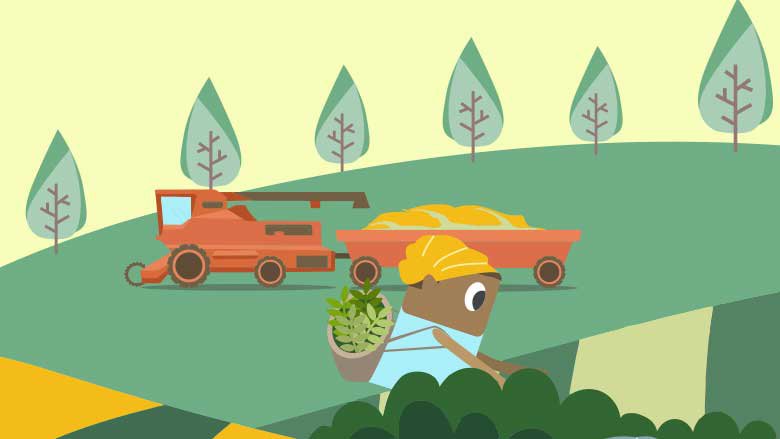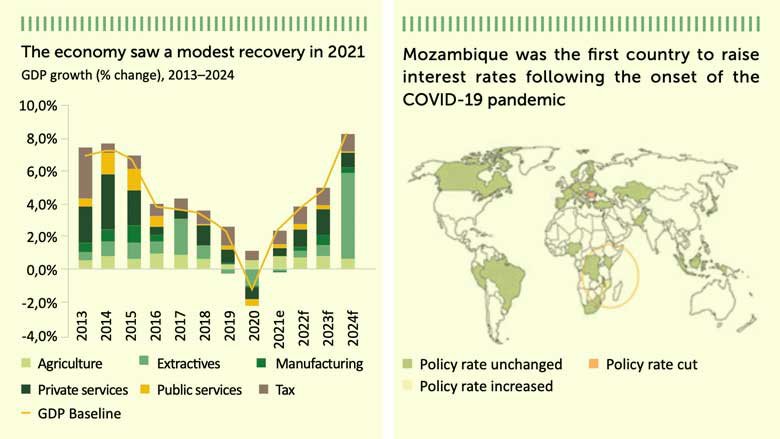The 8th edition of the focuses its analysis on the potential offered by agriculture to promote a sustainable and more inclusive recovery, and outlines reform options to realign agricultural support policies to achieve competitiveness, climate resilience and food security objectives. In its first section, the report assesses the country's economic recovery in the face of the crisis caused by COVID-19 and presents its economic outlook. Economic growth is expected to accelerate in the medium term, reaching an average of 5.7% between 2022 and 2024.

Recent economic developments and outlook:
Despite multiple consecutive shocks, including the COVID-19 pandemic that caused the first recession in nearly three decades, the Mozambican economy is recovering, but with considerable uncertainty. The country's gross domestic product (GDP) growth reached 2.2% in 2021, as favorable weather conditions supported agricultural growth, and the gradual lifting of COVID-19 containment measures boosted private consumption, fueling the recovery of services.
- Despite the gradual rise in domestic and global demand, growth in the extractive and manufacturing sectors remained moderate. Several constraints have dampened global economic performance, including the suspension of multibillion -dollar Liquefied Natural Gas (LNG) projects due to the escalation of the insurgency in the north of the country, tighter monetary policy, and new waves of COVID-19 infections.
- Revenue collection remained stable, and expenses were controlled despite significant tax pressures. The overall budget deficit is estimated to have decreased from 5.7% of GDP in 2020 to 4.5% in 2021. However, domestic public debt continued to increase as authorities resorted to the internal market to meet financing needs, given Mozambique's limited access to external financing. Domestic debt stocks reached 22% of GDP in 2021, up from 16% in 2019.
- Economic growth is expected to accelerate in the medium term, reaching an average of 5.7% between 2022 and 2024, as demand recovers further, and the economy benefits from the start of LNG production at the ongoing offshore coral project in 2022 and the expected restart of larger LNG projects. The recovery in global demand and commodity prices will continue to support export growth, and inflows of Foreign Direct Investment (FDI), especially those linked to LNG, will sustain investments.
- The three-year agreement with the IMF for 2022-2025 and resumption of budget support from other development partners will further strengthen the economic recovery while resolving debt and financing constraints. However, risks persist and can substantially reduce growth. These include rising import prices due to the conflict in Ukraine, new waves of COVID-19 infection and insurgency in the north.
With the right support, agriculture can be a sustainable source of growth, poverty reduction and food security.
Agriculture remains the country's main economic activity and its agro-ecological diversity could be harnessed to achieve food security. The available data show that agricultural growth would reduce poverty and inequality three times faster than growth in any other sector. Despite its potential, agricultural productivity remains low by regional standards, with Mozambique having one of the lowest cereal yields per hectare. The Economic Update suggests policy options that can help realign agricultural support policies and programs to achieve competitiveness, climate resilience and food security objectives. These include:
- Shifting agricultural support to public goods and services such as rural infrastructure, animal and plant health services, and agricultural research that can deliver higher economic returns -- This shift will require mobilizing financial resources to ensure that it is as neutral as possible to the state budget, while also addressing some of the current structural issues with agriculture public spending (e.g., most sector expenditures are on salaries rather than investments).
- Shifting towards a more competitive agricultural policy support -- Mozambican farmers should produce based on market signals and should be moving towards full participation in regional free trade agreements (SADC and the African Continental Free Trade Area��AfCFTA). The gradual reduction of border measures could be accompanied by direct, decoupled, support to farmers who produce protected commodities.
- Reducing implicit taxation of food and increase support to food-insecure households -- Mozambican food consumers are funding the bulk of support to the agricultural sector by paying an implicit tax due to border protection measures (MPS). This hits the poorest households hardest. Gradually reducing the MPS would consequently increase the welfare of the poorest.
- Shifting support towards smart subsidies -- Producer support could be reformed to allow farmers to choose what to produce; support crop production intensification as opposed to area expansion; and expand access to safe and nutritious food. Not least of all, integrate climate-smart, nutrition-sensitive agricultural technologies and practices into input and technology support incentives to promote productivity growth, build resilience and achieve environmental and nutrition objectives.
